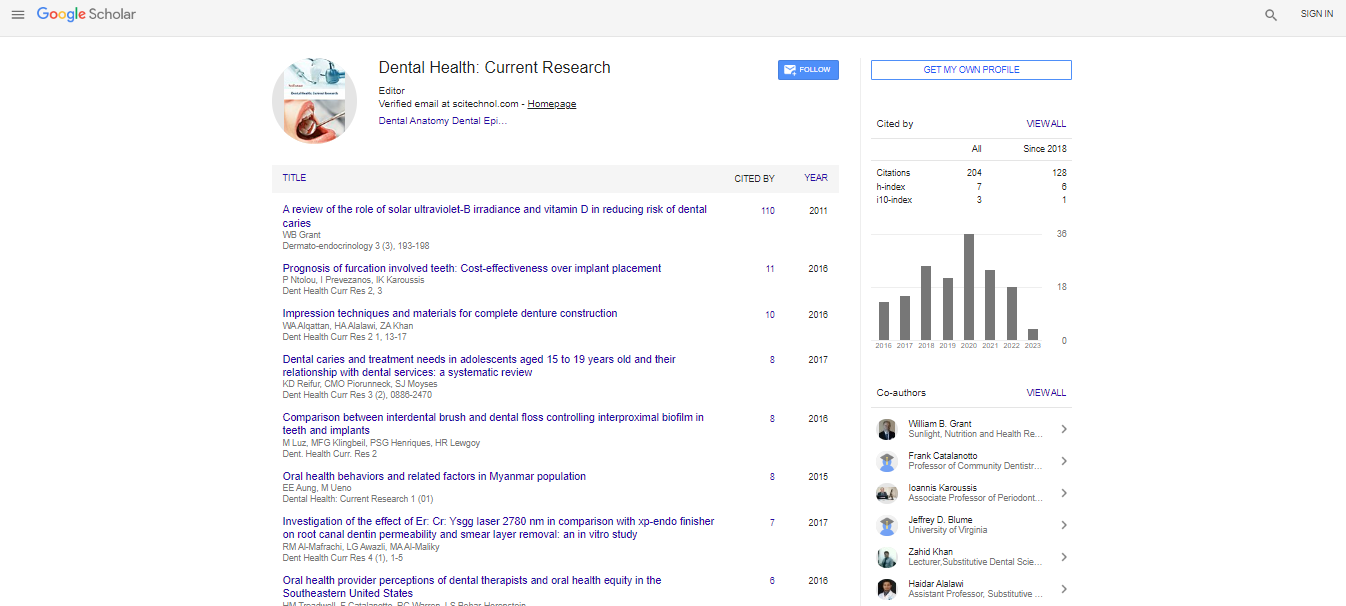Opinion Article, Dent Health Curr Res Vol: 10 Issue: 2
Tooth Decay to Gum Disease: A Comprehensive Guide to Senior Dental Care
Raymer Johnsvid*
1Department of Pediatric Dentistry, School of Dentistry Case Western Reserve University, Cleveland, Ohio , USA
*Corresponding Author: Raymer Johnsvid,
Department of Pediatric Dentistry,
School of Dentistry Case Western Reserve University, Cleveland, Ohio , USA
E-mail: johnsvid@gmail.com
Received Date: 27 March, 2024, Manuscript No. DHCR-24-135565;
Editor assigned Date: 29 March, 2024, PreQC No. DHCR-24-135565 (PQ);
Reviewed Date: 12 April, 2024, QC No. DHCR-24-135565;
Revised Date: 19 April, 2024, Manuscript No. DHCR-24-135565 (R);
Published Date: 26 April, 2024 DOI: 10.4172/2470-0886.1000206.
Citation: Johnsvid R (2024) Tooth Decay to Gum Disease: A Comprehensive Guide to Senior Dental Care. Dent Health Curr Res 10:2.
Description
As we age, our oral health needs change, presenting new challenges and concerns. From tooth decay to gum disease, seniors are particularly susceptible to a range of dental issues that can impact their overall well-being. In this comprehensive guide, we'll explore the common dental problems faced by older adults and provide valuable insights into senior dental care practices. our oral health becomes increasingly vulnerable, influenced by factors such as natural wear and tear, medications, and medical conditions. Tooth decay and gum disease emerge as prominent threats, posing risks not only to dental health but also to systemic health, including cardiovascular health and cognitive function. In this guide, we aim to analyze on the unique challenges seniors encounter in maintaining optimal oral health. By understanding these challenges and implementing effective preventive measures and treatments, seniors can safeguard their smiles and enhance their overall quality of life.
Senior dental health is influenced by a combination of factors, including natural aging processes, lifestyle habits, and pre-existing medical conditions. One of the most prevalent concerns among seniors is tooth decay, which can lead to cavities and tooth loss if left untreated. Additionally, gum disease, such as gingivitis and periodontitis, becomes more common with age and can result in serious complications if not managed effectively. Prevention is key when it comes to senior dental care. Encouraging regular dental check-ups and cleanings is essential for early detection and treatment of dental problems. Seniors should also maintain a diligent oral hygiene routine, including brushing twice daily with fluoride toothpaste and flossing to remove plaque buildup. Moreover, avoiding tobacco use and limiting sugary snacks can significantly reduce the risk of tooth decay and gum disease.
For seniors who experience tooth decay, prompt intervention is crucial to preserve dental health. Depending on the severity of the decay, treatments may include fillings, crowns, or root canals to restore damaged teeth. In cases of extensive decay or tooth loss, dental implants or dentures may be recommended to improve chewing function and restore aesthetics. Gum disease requires comprehensive management to prevent its progression and minimize potential complications. This may involve professional deep cleanings to remove plaque and tartar buildup below the gumline, as well as antimicrobial treatments to reduce bacterial infection. In advanced cases, surgical interventions such as gum grafting or pocket reduction surgery may be necessary to restore gum health and stabilize the teeth. Senior dental care often requires special considerations due to agerelated factors such as reduced salivary flow, medication side effects, and mobility limitations. Dentists may adjust treatment plans accordingly, such as recommending saliva substitutes for dry mouth or prescribing alternative medications to minimize oral health risks. Additionally, caregivers play a vital role in assisting seniors with dental hygiene practices and facilitating access to dental services.
Regular dental visits are essential for seniors to maintain optimal oral health and detect any emerging issues early on. Dentists can provide personalized recommendations and preventive measures tailored to the individual needs of older adults. Moreover, routine examinations enable dentists to monitor changes in oral health over time and intervene proactively to prevent complications.
Conclusion
From tooth decay to gum disease, senior dental care encompasses a range of challenges that require proactive management and preventive strategies. By prioritizing regular dental check-ups, practicing good oral hygiene habits, and addressing dental issues promptly, older adults can enjoy improved dental health and overall well-being in their golden years. Remember, a healthy smile is an integral part of a fulfilling and active lifestyle at any age.
 Spanish
Spanish  Chinese
Chinese  Russian
Russian  German
German  French
French  Japanese
Japanese  Portuguese
Portuguese  Hindi
Hindi 